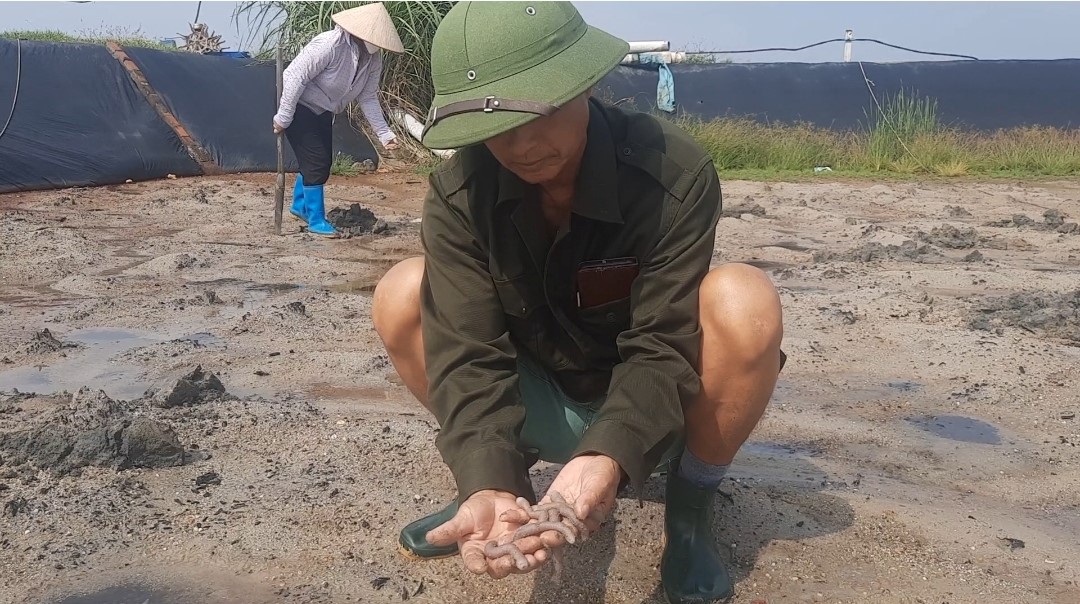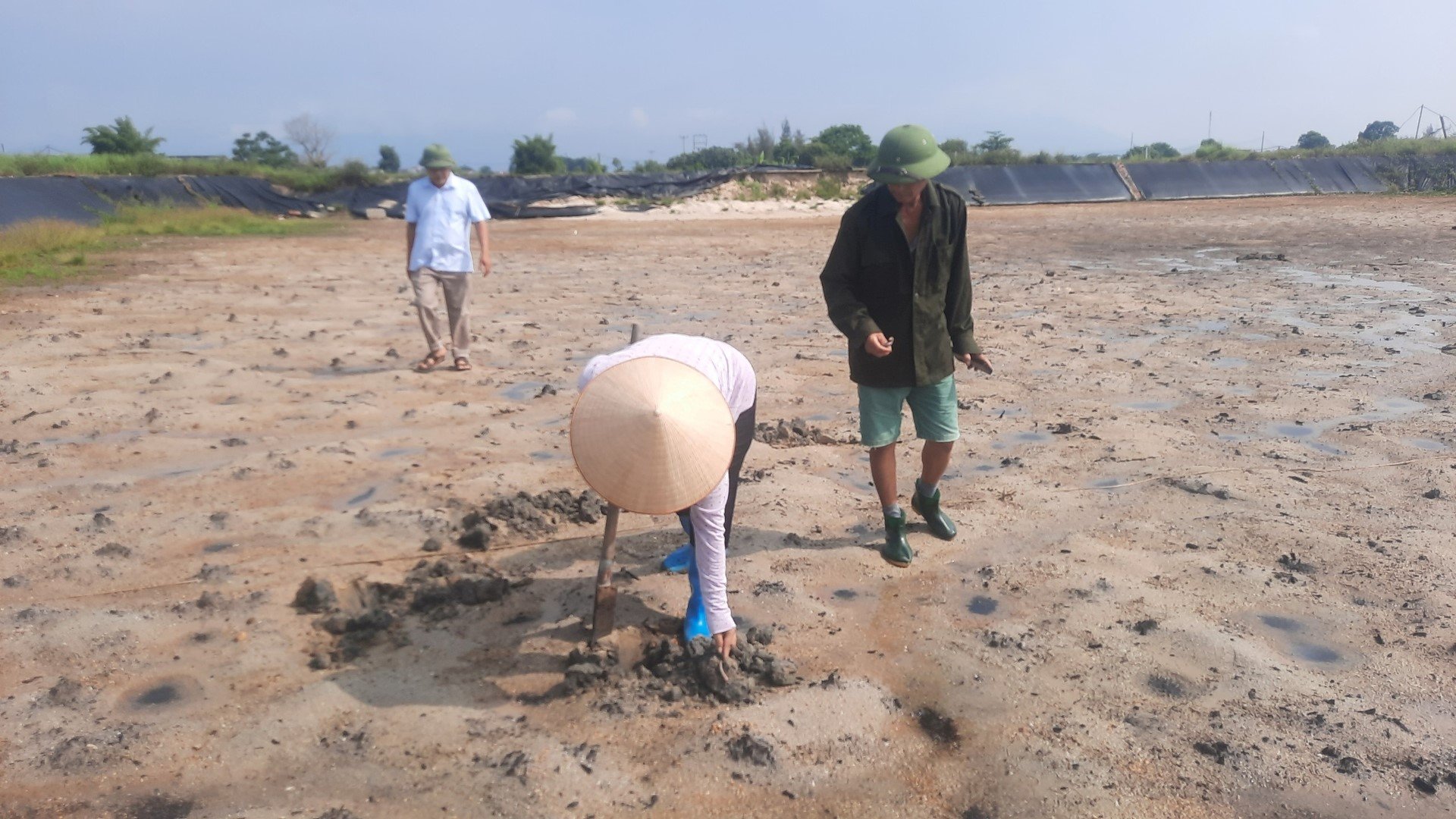December 31, 2025 | 21:40 GMT +7
December 31, 2025 | 21:40 GMT +7
Hotline: 0913.378.918
December 31, 2025 | 21:40 GMT +7
Hotline: 0913.378.918

Mr. Hoang Xuan Thu introduced the model of commercial peanut worm farming. Photo: Nguyen Thanh.
Peanut worms are a type of rare and valuable seafood from the waters of Quang Ninh province, mostly distributed in some localities, such as Van Don, Dam Ha, and Mong Cai. Over the past time, peanut worms have been caught more and more, along with the impact of the environment and water pollution, so this resource has gradually narrowed its living space and is at risk of extinction.
In Dam Buon village, Dam Ha commune, Dam Ha district, Quang Ninh province, Mr. Hoang Xuan Thu is a pioneer in raising peanut worms in earthen ponds. It is known that in 2018, Mr. Thu started pilot farming in an area of 100 m2. Realizing the peanut worms’ good growth, Mr. Thu expanded the model to four ponds with a width of 2500 m2/pond. The food for the worms is pureed trash fish, with a feeding time of about every two months. Each year, a pond can harvest about 500kg of fresh peanut worms, with a selling price of VND 230,000/kg.
Dug peanut worms are immediately purchased at the farming area by traders. In order to exploit peanut worms effectively, Mr. Thu only catches the adult heads. In addition, during the peanut worms’ breeding period around June and July on the lunar calendar, Mr. Thu does not exploit peanut worms to maintain an abundant quantity in the pond. This is a model that brings economic efficiency and creates a stable source of income for people, especially when peanut worms are currently rare and precious seafood with signs of decline in Quang Ninh.
Van Don district currently has more than 2,000 large and small alluvial grounds, which are the living places of the peanut worm species and are also the main source of income for fishermen in the maritime region here. Many families have gotten out of poverty and become rich from exploiting this type of seafood, especially households that purchase and process dried peanut worms.
The price of fresh peanut worms purchased at the alluvial ground is about VND 200,000 - 300,000/kg, depending on the small or big types. Dried peanut worm costs VND 3 - 5 million/kg, depending on the quality. To get 1 kg of dried peanut worms, it takes 10 - 12 kg of fresh peanut worms.

Each of Mr.Thu’s farming ponds has an area of 2500 m2, and each year an earthen pond can harvest 500kg of fresh peanut worms. Photo: Nguyen Thanh.
Almost all activities of people exploiting peanut worms in alluvial grounds are completely spontaneous, without the management of local authorities. Many fishermen also carry suction machines and aerators to alluvial grounds to dig and suck peanut worms and other mollusks, leading to the risk of the extinction of this aquatic resource.
In order to strengthen the protection of peanut worm species, the Quang Ninh Provincial People's Committee issued Decision No. 318/2016/QD-UBND on regulating the list of prohibited fishing methods, professions, and tools and the period of prohibition on exploiting peanut worms in the province.
Accordingly, in order to protect the peanut worm resource, year-round prohibited fishing methods, professions, and tools include: creating caves; digging trenches; digging along the way of peanut worms; measures to pump sand and use high pressure pumps to catch peanut worms, causing the destruction of the peanut worms’ natural habitat; exploiting peanut worms by using sound, light, and chemicals to attract; and using fishing tools other than spades to exploit peanut worms.

Fresh peanut worms at Mr. Thu's model cost VND 230,000/kg. Photo: Nguyen Thanh.
In particular, during the peanut worms’ breeding season, all forms and methods of exploiting natural peanut worms are prohibited. Specifically, prohibiting fishing from June 1 to the end of July 31 every year.
Quang Ninh People's Committee also requested the Department of Agriculture and Rural Development to monitor, inspect, and disseminate information to the people about the protection of aquatic resources and the environment in the sea areas in general and areas with a distribution of natural peanut worms in the province in particular. Localities with naturally distributed peanut worms must direct functional forces to regularly inspect, guide, and organize the implementation of plans to protect peanut worm resources and handle violations in accordance with the law.
In the near future, Quang Ninh will also implement some solutions to protect peanut worm species, such as minimizing sources of pollution to the coastal environment, building conservation areas for peanut worm species, taking measures to protect their spawning grounds during the breeding season, researching technology for artificial seed production, and raising commercial peanut worms in order to restore and regenerate this rare aquatic resource.
Translated by Huyen Vu Thu

(VAN) From extensive shrimp ponds, baskets of don gathered on the mudflats, to boats carrying visitors to watch birds, all livelihoods here depend on clean water, green forests, and the calls of migratory birds.
/2025/12/26/0703-3-204813_117.jpg)
(VAN) Transparency in information and listening to local people have helped address ground clearance bottlenecks and build social consensus, thereby accelerating the progress of the JICA3 irrigation project.
/2025/12/27/0609-3-233846_327.jpg)
(VAN) The JICA3 project is expected to become a 'water shield,' helping control saltwater intrusion, proactively secure water resources, protect livelihoods, and promote sustainable development in coastal areas.
/2025/12/26/5654-3-164509_655.jpg)
(VAN) As Viet Nam makes strong commitments toward achieving net-zero emissions, controlling and reducing methane emissions in livestock production is increasingly becoming a mandatory requirement.

(VAN) 'People, Primates, Plants: Co-managing Biodiversity and Improving Livelihoods in Vietnam' (the PPP Project) is an international initiative implemented in Vietnam by BGCI, CEGORN, and ICRAF/World Agroforestry.

(VAN) Dak Nong established a risk-level zoning map for coffee, built a digital data platform for the sector, and promoted certified production in line with EUDR.
/2025/12/25/2709-1-211551_295.jpg)
(VAN) In response to the U.S. Marine Mammal Protection Act (MMPA), Gia Lai province is implementing many solutions to protect marine mammals and develop sustainable, responsible fisheries.